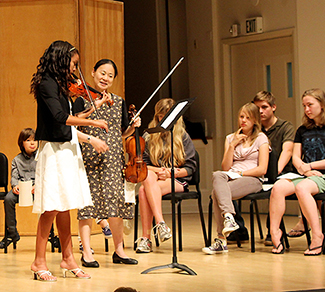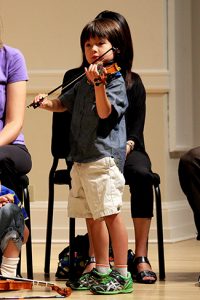 Midori Goto, one of America’s premier violinists, came to Eugene in July to thrill audiences of the Oregon Bach Festival. Since one of her passions is teaching children and young adults about music, she devoted much of one day to leading master classes. I was among those fortunate enough to watch two of the sessions, when she coached six talented teenagers who had prepared music to perform for this virtuoso performer.
Midori Goto, one of America’s premier violinists, came to Eugene in July to thrill audiences of the Oregon Bach Festival. Since one of her passions is teaching children and young adults about music, she devoted much of one day to leading master classes. I was among those fortunate enough to watch two of the sessions, when she coached six talented teenagers who had prepared music to perform for this virtuoso performer.
I have played violin since I was two years old, and so I can tell you that playing the violin is hard. Playing it as well as these six young people did — even harder. It takes years of learning to master every tiny muscle in the hands, arms, neck and entire upper body. But it’s so much more than that. Much of being successful in music is the mental control.
What I saw of Midori’s coaching left me tingling with excitement, not only because I am passionate about my violin music and the playing my kids do, but because she shared wisdom that all of us can use as parents and human beings.
Midori spoke to some key secrets to success in music — and life. From her work with these talented kids, I was reminded of some crucial pearls of wisdom:

Courtesy of Oregon Bach Festival
Lesson 1: Being amazing at something takes work, and lots of it. These kids weren’t born incredible violinists; they worked at it. Thousands of hours of practice, repetition, discipline and finding the joy in the process — that’s what makes you great at anything. The majority of people who are at the top of their field, be it music or medicine or business, will tell you that it took them a ton of work, dedication and time. Midori, as amazing as she is, spends several hours a day practicing her violin. But she always sees room for improvement.
Lesson 2: There is no problem so big it cannot be broken down into manageable pieces and solved. Whether it is tearing down a wickedly hard passage of classical violin music, a challenging math story problem or a difficult relationship. That is one of the greatest lessons I have learned from my violin. Something that seems overwhelming can be made manageable by breaking it into a series of little problems to be solved, and then pieced together to become a whole approach.
Lesson 3: Think about your goal, and then plot a way to get there. Midori challenged these kids to think about the message they wanted their music to convey, and then to make that the most important goal of their playing. Their body movements, facial expressions and tempo — everything needed to support the overall goal. In life, if we all could stand back and decide where we want to go, and then plot a course to get there, we would eliminate a lot of wasted time and effort.

Courtesy of Oregon Bach Festival
Lesson 4: Love yourself and be confident. Playing your music for an audience is scary. It feels as if you are putting your soul on display to be judged. But doing a gut-check, and then laying yourself on the line, is one of the best ways to succeed in life. People who see your passion will respect your effort. They may not always agree with you, but they will see how much you care. For those kids, the courage it took to stand up and play their music for one of their idols will surely be a source of confidence in the future. That same courage will help them build their way to college interviews, job applications and countless other challenges.
I tell parents in my pediatric practice all the time, music has so many life lessons to teach. Most kids will not grow up to be Midori, but every one of them who seriously engages with an instrument will become a wiser person from that experience.
Photos by Kelli Matthews, courtesy of the Oregon Bach Festival.
